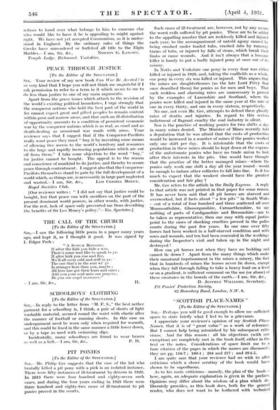PIT PONIES [To the Editor of the SPECTATOR.] SIR,—Mr. Philip
Gee suggests that the case of the lad who brutally killed a pit pony with a pick is an isolated instance. There were fifty instances of ill-treatment by drivers in 1929. In 1918 there were four hundred and eighty-seven such cases, and during the four years ending in 1928 there were three hundred and eighty-two cases of ill-treatment to pit ponies proved in the courts. Such cases of ill-treatment are, however, not by any means the worst evils suffered by pit ponies. These are to be added to the appalling number that are recklessly killed and injured each year, to the accompaniment of untold agony caused by being crushed under loaded tubs, crashed into by runaway trains of tubs, or injured by falls of stone, which break their limbs or cause wounds. And it isn't always that a humane killer is handy to put a badly injured pony at once out of its misery.
In Notts and Yorkshire one pony in every four was either killed or injured in 1929, and, taking the coalfields as a whole, one pony in every six was killed or injured. This argues that the mines are slaughterhouses (as the late Lord Privy Seal once described them) for ponies as for men and boys. That such reckless and alarming rates are unnecessary is proved by the examples of Lancashire and Scotland, where the ponies were killed and injured in the same year at the rate of one in every thirty, and one in every sixteen, respeetively.
No one, not even Mr. Gee, attempts to defend these ghastly rates of deaths and injuries. In regard to this serious indictment of flagrant cruelty the coal industry is silent.
Nor is the practice of working ponies for two shifts a dcv in many mines denied. The Minister of Mines recently toll a deputation that he was afraid that the costs of production would be increased in a number of mines if the ponies worked only one shift per day. It is intolerable that the costs of production in these mines should be kept down at the expense of the unfortunate ponies who have no trade union to look after their interests in the pits. One would have thought that the practice of the better managed mines—where the ponies only work one shift a day all the year round—would be enough to induce other collieries to fall into line. Is it too much to expect that the weakest should have the greatest consideration and fair play ?
Mr. Gee refers to the article in the Daily Express. A reply
to that article was not printed in that paper for some reason. It has never been said that all pit horses are starved and overworked, but if facts about " a few pits " in South Wales —out of a total of four hundred and three scattered all over Monmouthshire, Glamorganshire, Carmarthenshire, to say nothing of parts of Cardiganshire and Breconshire—are to be taken as representative, then one may with equal justice point to the cases of shocking cruelties proved in the police courts during the past few years. In one case over fifty horses had been worked in a half-starved condition and with sores and wounds, and ten had been concealed in the workings during the Inspector's visit and taken up in the night and destroyed !
How can pit horses rest when they have no bedding and
cannot lie down ? Apart from the many things which make their unnatural imprisonment in the mines a misery, the fact that in hundreds of mines the horses never lie down, except when they fall through failing to take a heavy load on a level or on a gradient, is sufficient comment on the use (or abuse) of these creatures in the bowels of the earth.—I am, Sir, &c., 82 Boundary Road, London, N.W. 8.








































 Previous page
Previous page